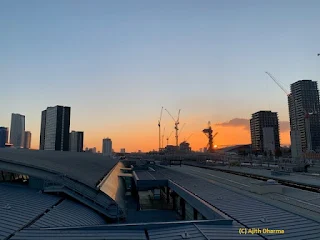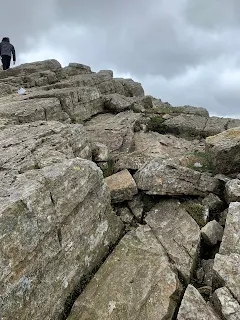I have always had a soft spot for Cuba. It is partly because of the Cuban Revolution and its charismatic leaders: Che Guevara and Fidel Castro. In our youth, we had somewhat romanticised that revolution and its leaders. In somewhat of a pure ideological dream-world, we assumed Cuba was a socialist paradise, and that the USSR was a socialist heaven. To my utter surprise, some Labour party members in the UK also regarded Cuba as a model socialist country.
Few years back, some even said they wanted to move to Cuba, and some still say that today. I think to myself, 'would you really enjoy living there when the mass media shows you how much they still don't have? I mean not only the freedom to chose your rulers, but comfortable life in the West. What's wrong with life in UK? Yes, it's a capitalist country but you still have the NHS as a free healthcare facility. If you don't have a job you are given government benefits. There are problems but housing is still decent.'
Although I have never been to Cuba, I studied in the socialist USSR during the '80s. I soon realised that it was no heaven, nonetheless we loved the Soviet Union in our own way. We enjoyed the hospitality of the Soviets and appreciated the free education given to us. It was a unique country. Coming from the island of Sri Lanka, it opened our eyes to the world.
Living in the UK gave us the chance to progress and earn money. It was same for most of the other foreign graduates who ended up in western countries like the USA, Australia, New-Zealand, Canada and EU. They have now built new lives in these countries and settled in nicely. Some studied further and became educationalists, scientists and specialists in their respective fields. They used the opportunities they were given in the western world. But the nostalgia and yearning for the socialist USSR still exists among them.
I always wondered what happened to my Cuban friends. They played football and never forgot to call me even in the mid winter. Russian winter was very harsh, yet we played our football. I have only found Uday, Osvaldo, Ariel and Rubén. Most of my other friends emigrated from Cuba to greener pastures. I can't blame them. Uday and Ariel live in Cuba and are happy there. Uday lives with his family. Osvaldo is working in Tenerife, and Ruben is in Argentina. Ariel, now a director in an Electrical firm, told me that life in Cuba after Soviet Union collapsed was very hard. I knew it was hard for the Cuban government because economic aid from the Soviet Union was invaluable to them. They also gave other types of aid in the form of cheap oil, military alliance, and support with the Cuban industry. All of this stopped after the collapse of the Socialist Bloc. It was a very hard time, and the existing US embargo against Cuba since the '60s did not help either.
However, there have always been two opposing opinions on Cuba. The Socialists would say that Cuba had been developing fast, and that all would be well if the US embargo were lifted. And then there were those who condemned Cuba to be a third world banana republic. Although, as we all know now, Cuba has made lot of headways in their tourism and health sectors. Where is the unbiased truth?
I watched a brilliant documentary very recently. Apparently, Fidel Castro never attacked the American people, however he always criticized American Foreign policy. He valued American achievement in science and other fields, never condemned it, and this documentary proved that. But when Castro flew to United states to deliver his speech in United Nation's headquarters, American immigration treated him very shabbily. They did not offer him any diplomatic courtesy. Castro accepted it with a smile on his face.
The film was written, directed and produced by John Alpert. He visited Cuba in
the 1970s. He was interested in Cuban history and its politics. The best days for Cuba were during the '70s and '80s; although there were shortages, generally life was good. Shortly after 1992, however, Cuba spiralled into an economic downturn when the Soviet Bloc collapsed. John documented this very sensitive time for Cubans with compassion and understanding. He didn't judge them when he met a family desperate enough to raid their neighbour's farm and steal the only 2 cows the farmer owned. Throughout many decades, he visited the same families over and over again. Some of them, he found out, left Cuba altogether after some years, like most of my friends had, who had studied with me in Moscow.
Osvaldo goes back to his village in Cuba from Tenerife and happy to be back in his homeland. But Osvaldo and Uday have very different opinions. Osvaldo believes that Cuba needs a multi-party system. Uday supports the status quo, although he accepts it has its own problems. Uday said "Cuba is a good place to live, but really our economical system isn't working properly. We have to change many things in our economic system, but we can do it with one party. There are many reasons why our economic system does not work properly, but if we think just having multi party system would fix everything, then we are wrong."
And who doesn't? Look at the USA's very own Trump: he is not even leaving his post. Look at countries like Sri Lanka, India and Pakistan, who all have their multi-party systems but with corrupt politicians. However, I must say the Western world still doing much better economically than anywhere else.
John Alpert shows with his own excellent narration how Cuba lost their socialist zeal, and how it was tourism that finally saved Cuba. They may have stopped proselytising Socialism but countries like Venezuela still give them chap oil while having economic crisis of their own. Raul Castro slowly changing the Cuban economy. People can engage in limited trade activities, own their houses and offer services in a limited scale.
I think Cuban socialism has failed, and that they must change their economic policies. There is no other way for them. We must accept the cold, hard truth, even if it is difficult. This is what John's film "Cuba and the Cameraman" showed me.
I did not understand the scale of Cuba's deterioration after the collapse of Socialist Block until I saw this film.
Pictures were taken from Osvaldo Oliva.
Photo taken at Moscow Power Engineering Technical University in 1985 or 1986. Front row Ruben and Uday, Behind them were Huertas, Jorge Benitez and Badia. In the background Omar Pino.
Director John Alpert on Making the Documentary





















































